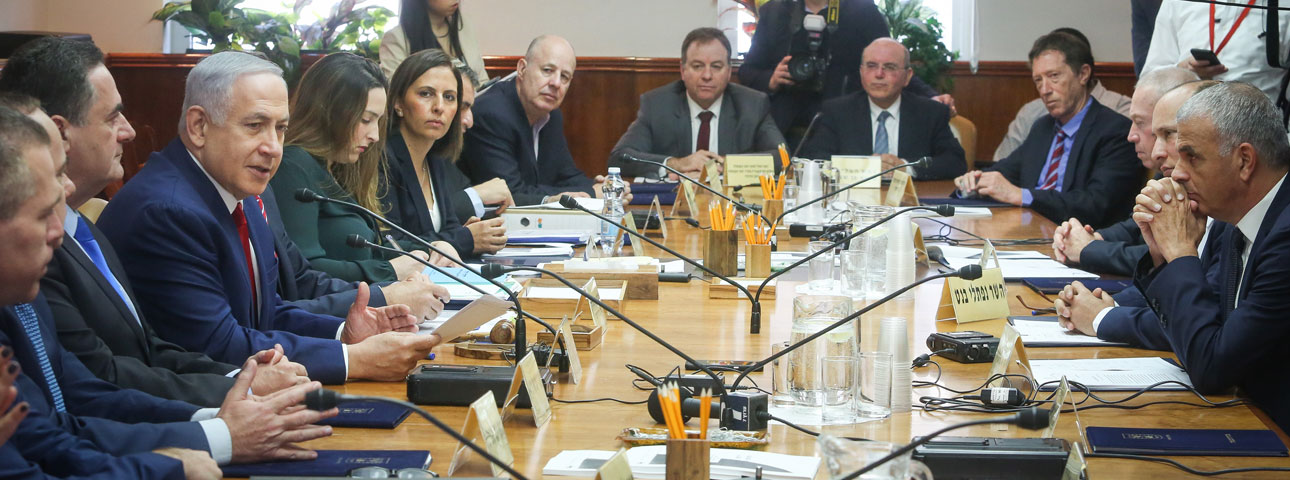Revoking Limitation on Number of Ministers - Ramifications
It wastes public funds, impairs government efficiency, and hinders its capacity to promote policy

Flash 90
Towards the Knesset’s vote today (Monday) to revoke the limitation on the number of ministers in the next government, the Israel Democracy Institute submitted a professional opinion, calling on members of the coalition to oppose the proposal.
The memorandum of law seeks to repeal the restriction set forth in Amendment 1 to Basic Law: The Government of 2014, according to which the number of members of the government, including the prime minister, was limited to 19, and the number of deputy ministers-- to four. After the elections to the 20th Knesset in 2015, this restriction was suspended by a temporary order to apply only to the term of the 20th Knesset, and the current opinion---seeks to annul it altogether.
IDI researchers, Dr. Assaf Shapira and Dr. Ofer Kenig, point out that this initiative, spearheaded by Prime Minister Netanyahu, is rooted in narrow and short-term political interests. Its adoption would waste public funds, be detrimental to government efficiency and hinder the ability to promote the Ministries’ policy. It is a tradeoff of Ministerial portfolios for “industrial quiet”.
Yohanan Plesner, president of IDI stated that “This is a decision whose sole purpose is to gain a political majority, through a tremendous waste of public resources. Adding ministers will be detrimental to the government’s efficiency and to its capacity to advance policy. Such a change in a Basic Law, for the sole purpose of serving an immediate political need, is both unnecessary and of dubious legitimacy.”
The opinion states that “in the past, an inflated government has led to the establishment of new Ministries, the need for which – is questionable. Furthermore, these superfluous Ministries—for example, the Ministry for Strategic Affairs; Jerusalem and Heritage; Regional Cooperation, and the Ministry for the Development of the Negev and the Galilee, divested authority from existing Ministries, thus undermining stability and the continuity of processes already underway”.
An international comparison conducted by the Israel Democracy Institute, shows that the number of ministers in Israel is very large, relative to the size of the Knesset.
Israel as compared to 10 other democracies of similar size
| Population (in millions) | Number of Ministers | % of ministers among the total members of Parliament * | Number of Ministries | |
| Norway | 5.3 | 22 | 13.00% | 15 |
| Denmark | 5.8 | 22 | 12.30% | 18 |
| Sweden | 10.2 | 22 | 6.30% | 12 |
| Israel | 9 | 21 | 17.50% | 28 |
| Portugal | 10.3 | 18 | 7.80% | 16 |
| Finland | 5.5 | 17 | 8.50% | 12 |
| Netherlands | 17.3 | 16 | 10.70% | 11 |
| Ireland | 4.9 | 15 | 9.50% | 16 |
| Slovakia | 5.5 | 15 | 10.00% | 13 |
| Czech Republic | 10.6 | 15 | 7.50% | 14 |
| Austria | 8.8 | 14 | 7.70% | 11 |
* In countries with two houses of parliament (Ireland, Czech Republic, Austria), we referred only to the lower, and more important house.
The number of ministers (including the Prime Minister) in the governments established after elections, on the day of the government's swearing-in, and up to one week after its swearing-in
